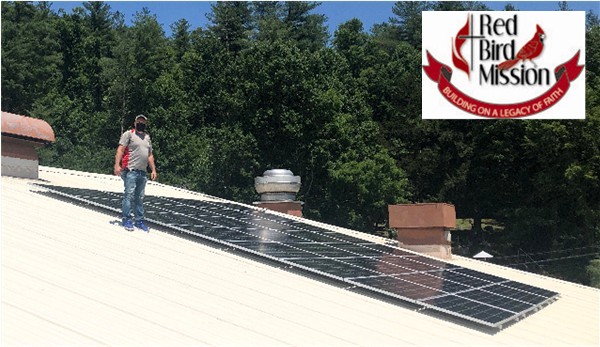
Red Bird Mission hosts a pre-kindergarten through 12th-grade accredited school, clinic, community store, craft program, dorms, affordable housing, cabins for volunteers and a variety of other services critical to the community.
BEVERLY, KY — Red Bird Mission, a nonprofit organization located at the confluence of the Clay, Bell and Leslie County lines, is currently installing 32 solar panels that will save them thousands on their utility bills.
The organization hosts a pre-kindergarten through 12th-grade accredited school, clinic, community store, craft program, dorms, affordable housing, cabins for volunteers and a variety of other services critical to the community. With electricity costs rising in all 65 buildings on their campus, Red Bird knew they had to do something. They called the Mountain Association for Community Economic Development (MACED) in 2017 for recommendations.
Since then, MACED has worked with them to complete several energy savings projects, and now estimates they are saving $42,000 a year. Because of the upgrades they made, their overall heating bill in the winter of 2019 dropped by $22,427 from the winter before.
“We are so grateful for all of the opportunities offered that led to a significant reduction of our energy costs, and provided key training opportunities for our staff and the community,” said Red Bird Mission Executive Director Kari Collins. “This has allowed us to move even further toward realizing the vision of creating and maintaining a healthy and sustainable community in and around the Red Bird valley.”
Red Bird Mission is on track to save even more as they continue to upgrade all their buildings, and after their solar project is completed. The solar project will save them another estimated $6,000 a year.
Red Bird worked with MACED to design an energy internship for Cecil Hall, one of their longtime staff members. Hall is currently being trained in HVAC systems, lighting, sealing, crawl space encapsulation, and, now, solar. He will primarily complete the energy work at Red Bird.
To provide further support for these energy projects, MACED connected Red Bird Mission with the Left Coast Fund, which offers grants to nonprofits through their Solar Moonshot Program. The organization granted Red Bird Mission $25,000 to pay for the solar installation.
“It’s exciting to see Red Bird Mission, located in the heart of ‘coal country’ Kentucky, go solar and become clean energy champions,” said Tara Hammond, founder of Hammond Climate Solutions, who manages the Solar Moonshot Program on behalf of Left Coast Fund. “We’re thrilled to assist Red Bird Mission in showcasing how solar can reduce electric bills and mitigate impacts to the climate crisis while contributing to a healthier, more equitable future for all.”
MACED worked with staff at Red Bird to help with solar system design and review contractor proposals. In early July, Cecil Hall and Fuzz Johnson, an employee of H.O.M.E.S. Inc. who is also being trained by MACED as a New Energy Intern, finished the electrical work required to begin the installation. The installation is expected to be completed by Wilderness Trace Solar, and it will go live in late July.
After graduating from the internship program, Hall will be able to train other Red Bird Mission employees and volunteers to complete energy savings improvements without hiring outside labor. Red Bird Mission is planning to incorporate this training into an adult training programming where Hall can train other community members in these skills.
For more information on this project or MACED’s energy program, please contact Ariel Fugate, Communications Coordinator at (859) 302-3868 or .
###
About the Mountain Association for Community Economic Development:
MACED is a 43-year-old nonprofit that works with businesses and communities in Eastern Kentucky to advance a just transition to a new economy in Central Appalachia. MACED offers loans and business guidance to existing and startup enterprises, particularly those that may not qualify for traditional financing. The energy programs help homeowners, businesses, nonprofits, schools and local governments use less energy and save money through utility bill analysis, on-site energy efficiency and solar assessments, consulting and financing. For more on MACED’s other programs, visit www.maced.org.









